
JFK International Airport, New York
13-sep-03
The cabbie that drives us to the airport is a Sudanese Muslim. He is enthusiastic about our mission. He also tells us that we will like the Syrians and Jordanians, but to beware of Egyptians because they are all thieves.
Royal Jordanian Airways uses a decrepit wing of the airport. There we meet the other members of our group, and our leader, Dr. Mohammed Bashar Arafat, who everyone calls Bashar.
A Jordanian waiting for the flight is very supportive of our group's goals, but warns us to avoid Shiites, that they are not true Muslims.
Jordan
14-sep-03
We arrive at Amman airport around 7:30 AM, after a 10 1/2 hour flight. We then wait for two hours because the Jordanian Embassy in Washington made an obvious and trivial clerical error on the group visa. None of the local officials is willing to honor the visa. (There are many No Smoking signs, but the immigration officials are all chain-smoking.) We finally pay 10 Dinar each (around US$14) and get to our tour bus.Although Amman is known for its seven hills, the overall landscape is flat, a hardscrabble desert. We have rarely seen cities with so little vegetation.
Our hotel, the Bristol, is quite posh. There are uniformed guards outside, armed with machine guns. This is where many NGO and diplomatic workers stay.
That evening we are welcomed to Jordan by Dr. Mohammed Abu-Hassan, former justice of the Jordanian Supreme Court. He will give us a lecture when we return to Amman.
That night we go to dinner with Dr. Abu-Hassan's son, who is himself a prominent lawyer. We go to a large restaurant called The Windmill, which has a neon windmill outside, but inside is a large, Bedouin-style tent. Most of the tables are family-sized, with low chairs beautiful rugs. Many customers smoke from "hubbly-bubblys", or hookahs. Even though I am very intolerant of tobacco smoke, I find the flavor sweet, pleasant, and utterly without any taste or smell of tobacco.
15-sep-03
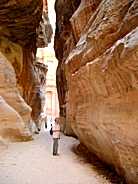
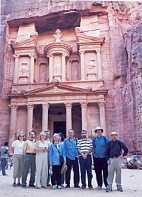 The next day we drive to Petra and spend the afternoon there.
It is an astonishing place.
The rock formations are of multi-colored sandstone, wind-sculpted into
sinuous shapes. We walk down the narrow defile, the Siq, with the canyon
walls towering hundreds of feet above us.
At times we can touch the two walls with both outstretched arms.
We turn a corner and confront "the Treasury",
the best-known building in the complex.
Petra is a large site, with many dwellings and temples cut
directly into the stone,
and even has an amphitheater carved into a stone bluff.
The next day we drive to Petra and spend the afternoon there.
It is an astonishing place.
The rock formations are of multi-colored sandstone, wind-sculpted into
sinuous shapes. We walk down the narrow defile, the Siq, with the canyon
walls towering hundreds of feet above us.
At times we can touch the two walls with both outstretched arms.
We turn a corner and confront "the Treasury",
the best-known building in the complex.
Petra is a large site, with many dwellings and temples cut
directly into the stone,
and even has an amphitheater carved into a stone bluff.
 The local Bedouin tribespeople have been hurt by the decline in tourism
after 9/11. Petra used to have 3,000 visitors each day of the high season,
now they get 300 on a good day.
The local Bedouin tribespeople have been hurt by the decline in tourism
after 9/11. Petra used to have 3,000 visitors each day of the high season,
now they get 300 on a good day.
16-sep-03
We drive west and enter a fantastic, otherworldly terrain of deeply-carved wadis (gulches) descending towards the Dead Sea. We stop at a military checkpoint, where a soldier tells us "you are all our guests and we welcome you." We then follow the coast north. We are now more than 1,300 feet below sea level.We stop at a luxury resort and pay a fee to use their beach. Swimming in the Dead Sea is very odd. You float like a cork, and it's difficult to stand in chest-deep water because your legs just bob out from under you to the surface. If the water touches your lips, eyes, or an open cut, it stings intensely.
North again, stopping at Mt. Nebo.
This is where Moses saw the Holy Land that he would never reach. He is
said to be buried in the valley below us.
On the peak there is a Franciscan monastery and a restored
Byzantine church overlooking the Jordan River valley and Israel.
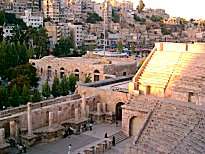
We reach Amman and stop briefly at the Roman amphitheater.
We are the only tourists there. (In fact, throughout Jordan and Syria we
see no American tourists and very few westerners.)
After our long day's drive,
we arrive at our Amman hotel
at 6:30. With a meeting scheduled (and already delayed) for 7:30,
there is no time to clean up.
16-sep-03, 7:30 pm
Our first meeting is at the hotel itself, in a conference room.
We meet with
Rasheed Uraykat,
a Protocol Officer of the Jordanian Foreign Ministry.
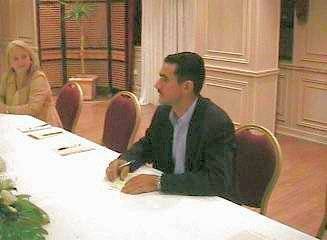
Uraykat speaks excellent English and has a master's degree in Conflict Resolution. Besides working as protocol officer, he in involved with inter-civilization communication efforts and is trying to esablish contacts between young Arabs and Americans.
After some pleasantries, Uraykat describes tomorrow's initerary, and then gives us some background information. He hopes that we can "teach the West" that Islam is not a threat. He cites the title of the Book "Clash of Civilizations" and expresses the hope that we can instead establish a "Dialogue of Civilizations". (We will hear this often; the title, at least, of Huntington's book has had a wide impact in the Middle East.)
A discussion of Sam's book, "Faces of the Enemy", leads to the disclosure that the Jordanian Ministry of Media is being phased out; Jordanian media will be privatized. There will be a new Media Council, though, that will try to enhance Jordan's image internationally. He notes that Al-Jezeera Network is not under any governmental control. Unlike Jordan, where there will be more press freedom but also "more responsibility". [I interpret this to mean that there will be punishments for any perceived abuses of this new freedom.]
Uraykat tells us that many ordinary Jordanians believe that the recent bombing of the Jordanian embassy in Baghdad was carried out by the U.S. in order to get more Jordanian support. They also believe that the Iraq "rebuilding" is a sham, noting that only American companies are participating.
Uraykat is working on creating an International conference on inter-civilization communications issues. Bashar points out the most such conferences in the Arab world are closed to the general public, and urges Uraykat to open it up.
16-sep-03, 9:40 pm
We get a short break to wolf down some food in the hotel restaurant, and at 9:40 we meet Dr. Abu-Hassan, an ex-justice of the Jordanian Supreme Court,
in our hotel conference room.
He gives us a prepared lecture on the Islamic influences on Western
jurisprudence.
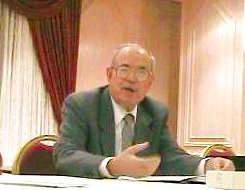
[Apologies for my spotty notes...]
In the 9th and 10th centuries, Europe had no city with a population larger than 30,000, except for Constantinople. 99% of the population was illiterate. At that time, Islamic Cordoba had a population of 1/2 to 1 million, and had 12 large public libraries. Each of these libraries was an order of magnitude larger than anything in Christian Europe. In 10th century Cordoba, there were 300 public schools, and there were 27 free schools for the poor. "The Univrsity is a pure creation of Arabic Civilization". [I didn't get the citation...] The University of Cordoba had Jewish professors on the faculty. The very idea of a university originated in the Islamic world; the Greeks and Romans didn't have them.
Sicily was under Islamic rule for 400 years. The Normans took Sicily but kept the administration intact. William the Conqueror took his Islamic-educated staff with him to England to create the administration of his newly conquered country. The founder of Oxford University was educated at Cordoba University. English Common Law and the Magna Carta were both influenced by this. (He sites Barnes "History of Western Civilization" as a source for all this.)
Unique to Islam (according to Dr. Abu-Hassan) is Sharia, the intersection of legality and morality. Breaking the law is a sin, not just a civil violation. There are many schools of thought within Sharia.
Equality: racism is explicitly banned by the Koran. The idea of international law was founded by an Islamic scholar, Grotius was his pupil. Limitations on warfare, adherence to treaties, and bans on harming civilians were all Islamic ideas. (He sites "Islamic Origins of Civil Law" -- I missed the author's name.)
French Law: Pope Sylvester II (of the 10th century) graduated from Cordoba University in Islamic Law. He translated a body of Islamic legal texts into Latin and called it the "New Roman Law" to avoid controversy about its source. This code was the basis for the Napoleonic Code, the basis of the French legal system (and also that of Louisiana). (He noted that Europeans often translated Arabic texts without attribution.)
Islamic law was the first to distinguish between criminal intent and action. That is, it did not prosecute children or the insane because they could not harbor criminal intent.
Dr. Abu-Hassan also cited the Arabic inventions that enabled modern navigation, like the astrolabe and the lateen sail. [Much of this was information already familiar to me, so I didn't bother to add it all to my notes.]
Some of Dr. Abu-Hassan's claims seem extreme, but much of it I already know to be true.
17-sep-03, 9:30 am
Our first meeting today is with Ahmad Hemylayem, Minister of Awqaf (Religious Affairs). (Awqaf is literally translated "endowment".) We are warmly greeted and ushered to a meeting room. While we wait for the Minister, Bashar explains that the Mufti is responsible for doctrinal issues and the Minister of Awqaf handles administrative affairs.
We talk for awhile with the Minister's aide, with Bashar translating.
We exchange pleasantries about seeking common ground.
The aide emphasizes Mohammed as a merciful man, and that Sharia's goal
is to have peace enter the hearts of all people.
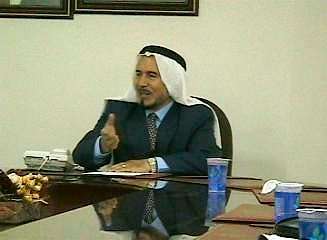
The Minister arrives and apologizes for being late. He greets us warmly, and recalls that he and his wife visited the U.S. for a month in the 80's. We are served water and tea. (We would be served tea or coffee at every meeting in the Middle East.) Bashar introduces us, and we are introduced to 4 of the Minister's staffers, including his Director of Public Relations and Media.
The Minister cites the Koran regarding inclusiveness and tolerance, including a long quote from chapter 4, "the Woman", and one we heard often, "We made you into nations and tribes that you may know each other." He told the story of how Mohammed stood up in respect when a Jewish funeral procession passed by.
When asked about Western secularism, he says "if secularism is to spread science and knowledge, we're all for it. But if it's a departure from religion and morality and the family, and if it fosters disrespect between men and women, are against it."
He's not wishy-washy. He states that extremism in Afghanistan started because of the U.S.-Russia conflict. He denounces the killing of innocent people, including Jews, but he also denounces some Israeli policies, particularly home demolition. "We in the Hashemite Kingdom have good relations with the U.S." He feels that Jordan has a difficult time "keeping the middle ground" in the region.
When asked about Jordanian response to terrorism, he denounces acts of Muslim violence as well as Israeli. There are, he says, extremes in all religions. He is concerned with "aggression and injustice towards weak peoples and small nations", a clear reference to the Palestinians. Americans, he says, are sensitive to these concerns: "We ask American people to achieve what they believe in their hearts." The inequity between weak and strong has led to the current extremism.
Of Iraq he says that Jordanians feared Saddam Hussein, but that the current situation is just as fearful.
We feel that this meeting is somewhat ceremonial in nature, partly because of the translation process.
After the meeting we are escorted to the Minister's private office. He surreptitiously asks Bashar, as we later learn, if we would be offended by the gift of a Koran. Learning otherwise, he presents us with beautiful copies, in Arabic, of the Koran. In the Middle East, this is a very significant gift.
We head north towards the Syrian border.
The landscape is almost a desert, with rolling low hills.
Seemingly in the middle of nowhere we reach an armed compound,
surrounded by
guard towers and razor wire.
17-sep-03, 11 am
North of Amman, near the Syrian border, the landscape is almost a desert, with rolling low hills. Seemingly in the middle of nowhere we reach an armed compound, surrounded by guard towers and razor wire.
This is Al Al-Bayt University. We are ushered to the office of Dr. Salman Al-Bdour, the president of the University. His English is excellent and he is frank, charming, and informative.
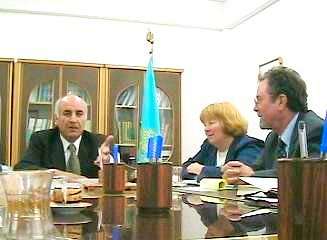 We start with the usual niceties and are served coffee and tea.
We start with the usual niceties and are served coffee and tea.
Al-Bdour: We now have conflict between extremists on both sides, and this idea is relatively new here. He cites the book title "Clash of Civilizations" and asks whether we have a conflict of civilizations or of ideas. Our current conflicts are between followers of religions, not between the religions themselves.
He talks about al-Afghani, a 19th center thinker who wanted to unify the monotheistic religions but found that is was impossible to unify even one religion. (Al-Bdour assumes that we know more about Islam than we actually do. This is a change; most people assume that we're entirely ignorant of it.)
32 nationalities are represented here. There are 400 foreign students, 68 on full scholarship. There are 14,000 students in all, 65% of them women. Women get the same education as men, and there are women on the faculty in almost all departments. The University is only about 10 years old. It is surrounded by olive groves, and eventually hopes to derive 25% of its income from olive oil.
Al Al-Bayt University teaches many faiths but only monotheistic ones. (He means that they don't teach anything like Buddhism or Hinduism.) Seven different major schools of Islam are taught, and Dr. Al-Bdour states that extremism arises when only one school is taught exclusively. The school's teaching emphasizes reconciliation. He notes that Saudis won't send students to Al Al-Bayt because they perceive excessive Shiite influence. In talking about extremism and cults, Dr. Al-Bdour noted that it happens in America, too, pointing out the Waco, Texas events.
A question about how he deals with extremism in the student body led to a discussion of Palestine, an issue that we would hear much about. We asked him what would be the fundamentals of a lasting peace. He was evasive on this but did emphasize that it must be a just peace. He also emphatically accepted Israel's existence as a "fact".
U.S. activity, he said, damages all attempts at moderation in Jordan. He tries to keep an open mind and hope for the best, but every U.S. action seems to bring disappointment. He says that Bush should "get a new speech writer" -- every time he speaks he fans the flames. Al-Bdour cites the now-famous "crusade" quote as a particularly inflammatory statement that has not been forgotten here. He does admit, though, that "everyone trades on" the Palestine issue -- using the issue for their own ends.
We leave and head to the Syrian border. Security is strict, with a total of 5 checkpoints. But, oddly, the fence at the border only extends about a quarter-mile into the desert, beyond which there is no security at all. At the Jordanian exit station, we are treated very differently than at Amman airport. We bypass the long lines and are ushered to the luxurious VIP reception room and are served tea.